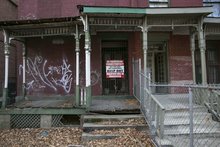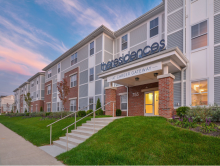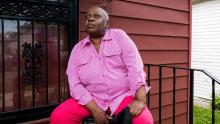0
News Article
Community:
Feb 23, 2019
Gerrymandered school boundaries and greater transportation costs are the trade-off school districts must make in order to achieve racial integration and close the racial achievement gap, said a researcher from the Urban Institute.
Authored by: Roger McKinney for Columbia Daily Tribune
Topics: Child welfare, Education, Legislation & Policy, Racial inequalities, Research, Transportation
 Shared by Housing Is
Shared by Housing Is
Housing Is posted a
on Feb 28, 2019
Roger McKinney for Columbia Daily Tribune
Gerrymandered school boundaries and greater transportation costs are the trade-off school districts must make in order to achieve racial integration and close the racial achievement gap, said a researcher from the Urban Institute.
1
News Article
Community:
Feb 7, 2019
When we stereotype or lazily assume low-wage workers to be “low skill,” it reinforces an often unspoken and pernicious view that they lack intelligence and ambition, maybe even the potential to master “higher-order” skilled work. In an economy that is supposed to operate as a meritocracy—but rarely does—too often, we see low wages and assume both the work and workers are low-value. This bias makes us overlook people for better-paying positions in which they might have excelled, hindering their social mobility.
Authored by: Byron Auguste for Forbes
Topics: Asset building, Low-income, Racial inequalities, Workforce development
 Shared by Housing Is
Shared by Housing Is
Housing Is posted a
on Feb 19, 2019
When we stereotype or lazily assume low-wage workers to be “low skill,” it reinforces an often unspoken and pernicious view that they lack intelligence and ambition, maybe even the potential to master “higher-order” skilled work.
0
News Article
Community:
Jan 3, 2019
But a new study found that in nearly all 50 of America’s biggest metropolitan areas, low-income families using federal housing vouchers remain overly concentrated in impoverished, racially segregated neighborhoods with little opportunity — even with plenty of affordable apartments available in higher income neighborhoods.
Authored by: Tracy Jan for The Washington Post
Topics: Housing, Mobility, Racial inequalities, Research
 Shared by Mica O'Brien
Shared by Mica O'Brien
Mica O'Brien posted a
on Jan 7, 2019
Tracy Jan for The Washington Post
But a new study found that in nearly all 50 of America’s biggest metropolitan areas, low-income families using federal housing vouchers remain overly concentrated in impoverished, racially segregated neighborhoods with little opportunity — even with plenty of affordable apartments available in highe
0
News Article
Community:
Dec 14, 2018
Opportunity zones are home to approximately 35 million Americans. It is estimated that the opportunity-zone designation could attract $100 billion in private investment in these areas, which would go a long way to spurring economic development and creating jobs.
Authored by: Ben Carson for The New York Times
Topics: Community development, Legislation & Policy, Partnerships, Place-based, Racial inequalities, RAD
 Shared by Mica O'Brien
Shared by Mica O'Brien
Mica O'Brien posted a
on Dec 17, 2018
Ben Carson for The New York Times
Opportunity zones are home to approximately 35 million Americans. It is estimated that the opportunity-zone designation could attract $100 billion in private investment in these areas, which would go a long way to spurring economic development and creating jobs.
0
News Article
Community:
Dec 5, 2018
Nearly 80 fair housing groups will be receiving federal funding to fight discrimination, the Department of Housing and Urban Development announced this week.
Authored by: Ben Lane for HousingWire
Topics: Funding, Housing, Legislation & Policy, Racial inequalities
 Shared by Mica O'Brien
Shared by Mica O'Brien
Mica O'Brien posted a
on Dec 10, 2018
Nearly 80 fair housing groups will be receiving federal funding to fight discrimination, the Department of Housing and Urban Development announced this week.
0
News Article
Community:
Dec 6, 2018
Recent research shows that social safety net programs benefit everyone.
Authored by: David L. Kirk for The New York Times
Topics: Asset building, Child welfare, Community development, Food insecurity, Legislation & Policy, Medicaid / Medicare, Racial inequalities, Research, Workforce development
 Shared by Mica O'Brien
Shared by Mica O'Brien
Mica O'Brien posted a
on Dec 6, 2018
David L. Kirk for The New York Times
Recent research shows that social safety net programs benefit everyone.
0
News Article
Community:
Sep 24, 2018
The Lake County Housing Authority (Ill.) developed a panel discussion where law enforcement officials, government officials, and those in educational leadership positions were asked to participate and to develop a strategy to confront the issue of race relations in the community.
Authored by: Ashanti Wright for Journal of Housing & Community Development
Topics: Housing, Low-income, Partnerships, Racial inequalities
 Shared by Mica O'Brien
Shared by Mica O'Brien
Mica O'Brien posted a
on Oct 30, 2018
Ashanti Wright for Journal of Housing & Community Development
The Lake County Housing Authority (Ill.) developed a panel discussion where law enforcement officials, government officials, and those in educational leadership positions were asked to participate and to develop a strategy to confront the issue of race relations in the community.
0
News Article
Community:
Oct 9, 2018
About 6 percent of baby boomers and 17 percent of African American baby boomers have been homeless at some point in their lives, according to the first national study in decades to look at lifetime homeless rates. The study, released last month, suggests older black Americans are about three times more likely to experience homelessness than white Americans.
Authored by: Jeff Stein for The Washington Post
Topics: Homelessness, Housing, Racial inequalities, Research, Seniors
 Shared by Mica O'Brien
Shared by Mica O'Brien
Mica O'Brien posted a
on Oct 11, 2018
Jeff Stein for The Washington Post
About 6 percent of baby boomers and 17 percent of African American baby boomers have been homeless at some point in their lives, according to the first national study in decades to look at lifetime homeless rates.
0
News Article
Community:
Oct 3, 2018
For years, Dallas has poured millions of federal dollars into affordable housing, to little effect. But in May, the City Council unanimously passed a new comprehensive housing policy, a first for the city. The goal is to build 20,000 new homes — but only in select, pre-approved neighborhoods deemed ripe for revitalization.
Authored by: Teresa Wiltz for Stateline
Topics: Community development, Housing, Legislation & Policy, Low-income, Mobility, Racial inequalities, South
 Shared by Mica O'Brien
Shared by Mica O'Brien
Mica O'Brien posted a
on Oct 4, 2018
Teresa Wiltz for Stateline
For years, Dallas has poured millions of federal dollars into affordable housing, to little effect. But in May, the City Council unanimously passed a new comprehensive housing policy, a first for the city.
0
News Article
Community:
Oct 1, 2018
Some places lift children out of poverty. Others trap them there. Now cities are trying to do something about the difference.
Authored by: Emily Badger and Quoctrung Bui for The New York Times
Topics: Child welfare, CLPHA, Community development, Criminal justice, Housing, Low-income, Metrics, Mobility, Racial inequalities, Research, Stability, Youth
 Shared by Mica O'Brien
Shared by Mica O'Brien
Mica O'Brien posted a
on Oct 1, 2018
Emily Badger and Quoctrung Bui for The New York Times
Some places lift children out of poverty. Others trap them there. Now cities are trying to do something about the difference.
1
News Article
Community:
Aug 19, 2018
A body of evidence points to a link between living in areas of concentrated poverty and health.
Authored by: Paul Chisholm for NPR
Topics: Child welfare, Community development, Health, Housing, Low-income, Medicaid / Medicare, Metrics, Partnerships, Racial inequalities, Safety
 Shared by Housing Is
Shared by Housing Is
Housing Is posted a
on Aug 20, 2018
A body of evidence points to a link between living in areas of concentrated poverty and health.
0
News Article
Community:
Jul 9, 2018
Neighborhood may matter more than race in breast cancer survival rates
Authored by: Darcel Rockett for THE CHICAGO TRIBUNE
Topics: Health, Legislation & Policy, Low-income, Medicaid / Medicare, Midwest, Racial inequalities
 Shared by Abra Lyons-Warren
Shared by Abra Lyons-Warren
Abra Lyons-Warren posted a
on Jul 12, 2018
Darcel Rockett for THE CHICAGO TRIBUNE
Neighborhood may matter more than race in breast cancer survival rates
0
News Article
Community:
May 25, 2018
Community organizations are improving health equity by tackling the cycle of poverty in urban neighborhoods.
Authored by: Jacqui Cook
Topics: Asthma, Child welfare, Community development, Early childhood, Exercise, Family engagement, Health, Low-income, Medicaid / Medicare, Midwest, Nutrition, Obesity, Out-of-school time, Partnerships, Preventative care, Racial inequalities, Research, Safety, Youth
 Shared by Housing Is
Shared by Housing Is
Housing Is posted a
on Jul 11, 2018
Community organizations are improving health equity by tackling the cycle of poverty in urban neighborhoods.
0
News Article
Community:
Dec 11, 2017
Authored by: Elizabeth A. Harris for The New York Times
Topics: Attendance, Child welfare, East Coast, Education, Grade-level proficiency, Homelessness, Housing, Legislation & Policy, Low-income, Metrics, Out-of-school time, Racial inequalities, Research, School-readiness, Stability, Youth
 Shared by Housing Is
Shared by Housing Is
Housing Is posted a
on Jul 5, 2018
Elizabeth A. Harris for The New York Times
0
News Article
Community:
Feb 5, 2018
Graduation rates in Arkansas have improved for all racial groups under this program
Authored by: Meredith Kolodner for The Hechinger Report
Topics: Cost effectiveness, Dual-generation, Education, Family engagement, Legislation & Policy, Low-income, Post-secondary, Racial inequalities, South, Youth
 Shared by Housing Is
Shared by Housing Is
Housing Is posted a
on Jul 5, 2018
Meredith Kolodner for The Hechinger Report
Graduation rates in Arkansas have improved for all racial groups under this program
1
News Article
Community:
Jul 3, 2018
Researchers have shown — and teachers know — that schoolchildren exposed to neighborhood violence can have a tougher time learning, experiencing more stress and depression than their peers growing up in safe neighborhoods. But a Johns Hopkins University sociologist discovered that the consequences of neighborhood violence reach further than previously known, even spilling over to students who come from safe neighborhoods. Using crime and student data from Chicago, Julia Burdick-Will linked exposure to neighborhood violence to a drop in test scores, an effect that extended to students coming from communities that experienced little or no violence.
Authored by: Moriah Balingit for The Washington Post
Topics: Attendance, Child welfare, Community development, Depression, Education, Health, Low-income, Mental health, Midwest, Out-of-school time, Post-secondary, Racial inequalities, Research, Youth
 Shared by Mica O'Brien
Shared by Mica O'Brien
Mica O'Brien posted a
on Jul 3, 2018
Moriah Balingit for The Washington Post
Researchers have shown — and teachers know — that schoolchildren exposed to neighborhood violence can have a tougher time learning, experiencing more stress and depression than their peers growing up in safe neighborhoods.
0
News Article
Community:
Jul 2, 2018
Poor children don't struggle in school because of their parents. They struggle because of poverty.
Authored by: Mical Raz for The Washington Post
Topics: Attendance, Child welfare, Dual-generation, Early childhood, Education, Family engagement, Food insecurity, Grade-level proficiency, Housing, Legislation & Policy, Literacy, Low-income, Out-of-school time, Post-secondary, Racial inequalities, Research, School-readiness, Youth
 Shared by Mica O'Brien
Shared by Mica O'Brien
Mica O'Brien posted a
on Jul 3, 2018
Mical Raz for The Washington Post
Poor children don't struggle in school because of their parents. They struggle because of poverty.
0
News Article
Community: Youth
Authored by:
Topics: Education, Housing, Low-income, Post-secondary, Racial inequalities, South, Youth
 Shared by Housing Is
Shared by Housing Is
Housing Is posted a
on Apr 27, 2017
 Shared by Housing Is
on Feb 28, 2019
Shared by Housing Is
on Feb 28, 2019

 Shared by Housing Is
on Feb 19, 2019
Shared by Housing Is
on Feb 19, 2019












 Shared by Housing Is
on Aug 20, 2018
Shared by Housing Is
on Aug 20, 2018


 Shared by Abra Lyons-Warren
on Jul 12, 2018
Shared by Abra Lyons-Warren
on Jul 12, 2018

 Shared by Housing Is
on Jul 11, 2018
Shared by Housing Is
on Jul 11, 2018
 Shared by Housing Is
on Jul 5, 2018
Shared by Housing Is
on Jul 5, 2018

 Shared by Housing Is
on Jul 5, 2018
Shared by Housing Is
on Jul 5, 2018






